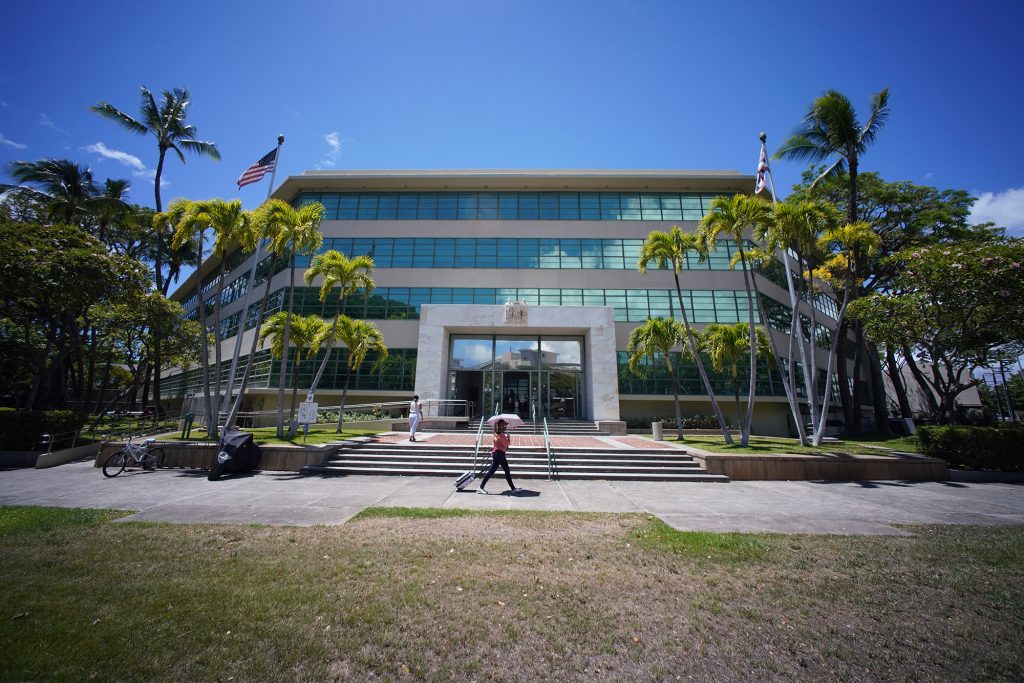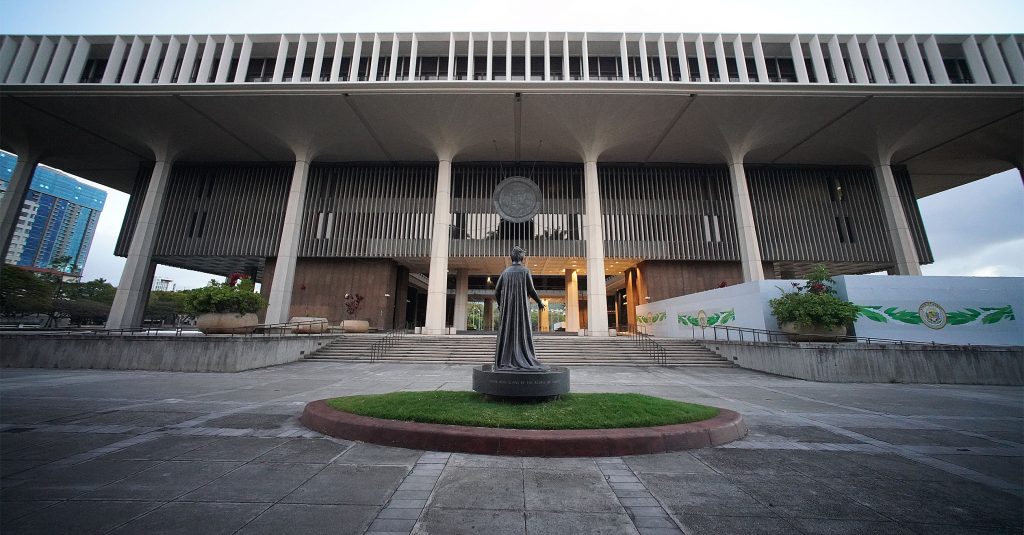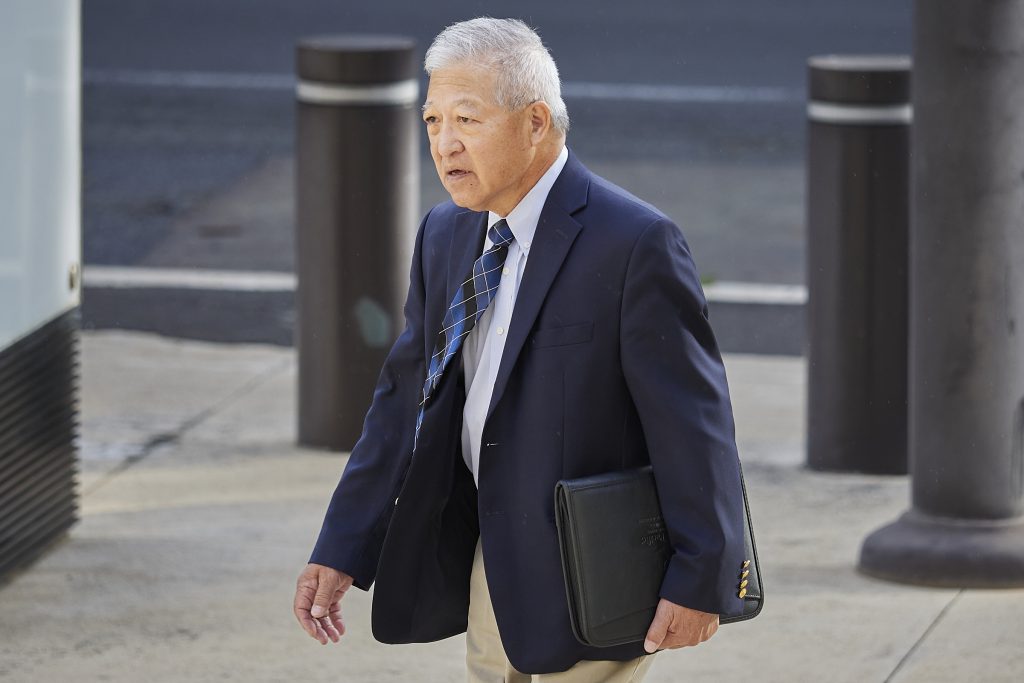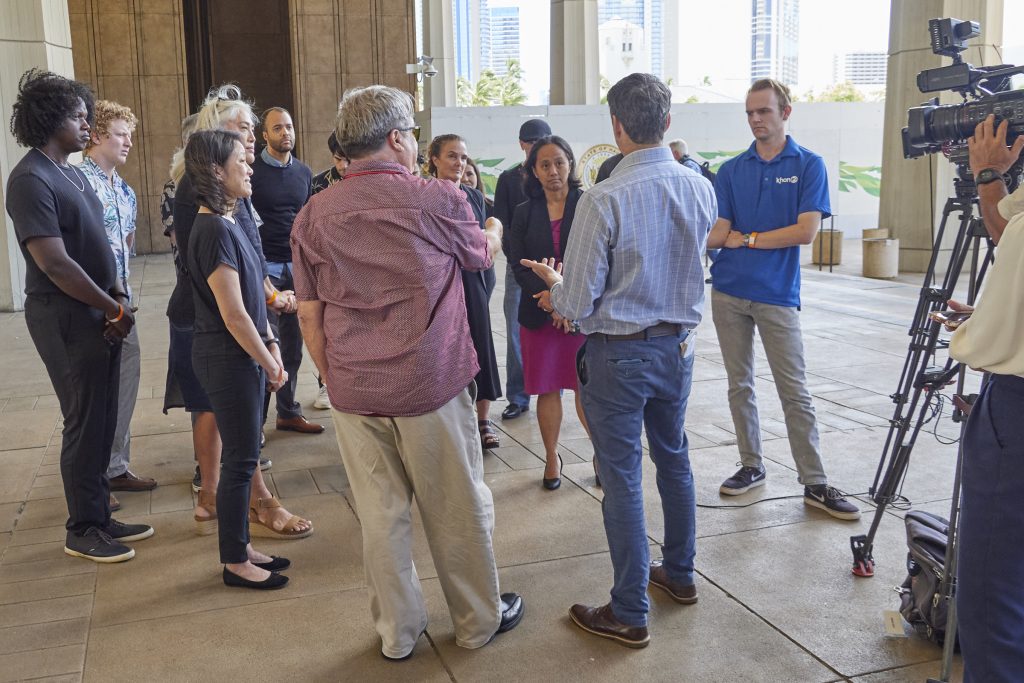A lack of institutional knowledge among board members and staff is limiting the BOE's effectiveness and leaving it open to legislative interference, education advocates say.
A lack of institutional knowledge among board members and staff is limiting the BOE’s effectiveness and leaving it open to legislative interference, education advocates say.
When former state Rep. Roy Takumi went before the Senate Education Committee on Monday, he had a promise for his former legislative colleagues: If confirmed to lead the Hawaii Board of Education, he would hold Department of Education leaders accountable for the progress of public schools.
“When you really distill what the board is responsible for, it’s to hold the department accountable in measurable outcomes,” he said, adding that he would do whatever it takes to improve how the board operates.
Takumi, who served as a state representative for nearly 30 years, has been tapped by the governor to chair the BOE at a difficult time for the volunteer-led board tasked with overseeing public education in the state.
After the unexpected resignation of BOE Chair Warren Haruki last month, the board is facing its third change in top leadership in two years. Since September, it’s also lost three of four staff members who helped manage the board’s bimonthly meetings and ensure compliance with the state’s public transparency law. Seven of the nine voting members on the board are currently up for Senate confirmation.

Advocates and former education leaders say the continued churn in board membership has limited BOE’s ability to effectively oversee the Hawaii Department of Education and set educational policy for nearly 300 schools in the state. In the absence of steady board leadership, they say that BOE’s ability to operate with transparency and maintain its independence from the Legislature has deteriorated.
In a break from previous practices, the board has delayed publicly posting its materials for its bimonthly meetings since last year and didn’t require DOE to share the salaries of its top leaders when considering raises in 2023. Lawmakers have also pushed to add new graduation requirements to high school curriculums and tried to reorganize internal DOE offices, reforms that some say should be left up to the department and the board.
The board has long lacked the staffing and resources needed to properly oversee DOE leadership, said Randall Roth, professor emeritus at the University of Hawaii School of Law. At the same time, he added, the Legislature holds an “outsized control” over funding for public schools – a fact that board members and DOE administrators are well aware of.
But the recent board turnover may offer more opportunities for legislators to insert themselves in policy debates and leadership decisions which typically don’t require their involvement, said Catherine Payne, who served as BOE chair from 2018 to 2022.
“I worry about the board with the kind of changes that are happening,” she said.
The spate of shakeups in BOE’s top leadership began in June 2023, when Gov. Josh Green abruptly announced that longtime businessman Warren Haruki would replace Bruce Voss as chair. At the time, Voss had been on the board for eight years and was one year into his three-year term as chair.
Green said in an interview last week that he wanted to make an impact on Hawaii schools by picking a new board leader. He added that some senators approached him last summer and asked if Haruki would be willing to serve on the board, although Green wouldn’t specify which legislators had offered their input on the appointment process.
“Every governor needs to take responsibility at these top levels, and governors should choose their board chair,” Green said.
But the announcement caught many education advocates and board observers by surprise. Payne said Voss himself only learned about Green’s decision once it was made public. Voss declined to comment for this story.

Haruki took leadership of the board in July, but turnover at the BOE continued.
According to DOE communications director Nanea Kalani, the chair’s private secretary left the board when the Legislature failed to fund her position for another year. The following month, the board’s executive director voluntarily left her job, Kalani said, although Payne and others raised concerns that she vacated the post shortly after Haruki became board chair.
By October, the board analyst had also departed, leaving the board secretary as the only remaining staff member.
Payne said the departure of nearly all board staffers was concerning, given the steep learning curve board members face when it comes to understanding the DOE’s inner workings. The staff also played a key role in ensuring that the board operated with transparency, with the former executive director going so far as to eat lunch with board members to ensure they weren’t discussing any BOE-related business outside of public meetings, Payne said.
“We adhered to it very, very carefully,” Payne said of the Sunshine Law, which outlines the standards and practices Hawaii boards must follow to maintain transparency.
One change that drew complaints was in the posting of information packets for board meetings, which were previously posted six days in advance. Starting in the fall, many of the materials were posted online two days before the meetings instead.
“I have grave concerns that its current practices are actually designed to discourage public participation in the public meeting process.”
Vanessa Ott, former DOE teacher
Haruki said the board complies with the Sunshine Law, which only requires board materials to be publicized 48 hours in advance.
“We are following statutes, versus best practices,” he said.
But longtime attendees to BOE meetings said the later publication date does not give them adequate time to prepare testimony and review board materials.
“I have grave concerns that its current practices are actually designed to discourage public participation in the public meeting process,” former teacher Vanessa Ott said in a letter to the Office of Information Practices earlier this year.
In October, the board ignored its own policies around pay transparency when it approved Superintendent Keith Hayashi’s request to boost the salaries of 21 subordinate superintendents. While the department projected the raises would cost more than $232,000, it did not specify the current or proposed salaries of the 21 leaders — something the board had emphasized the importance of the previous year.
“Requiring the superintendent to provide exact salaries when seeking salary adjustments gives the Board the information it needs while simultaneously providing a comparable level of transparency to the public that other departments provide,” BOE vice chair Kaimana Barcarse wrote in a May 2022 memo.
The board is supposed to oversee public education by appointing the DOE superintendent, setting policy in areas like graduation requirements and holding the department accountable to the goals set in its strategic plan. The Legislature is tasked with passing laws on public education and funding schools.
Because both bodies are responsible for setting policies affecting schools, it’s sometimes difficult to determine what educational responsibilities fall under the BOE versus the Legislature, said Randy Moore, a former DOE administrator and teacher.
“I’m not sure if there is a line,” Moore said. “If it is, it’s extremely fuzzy and broad.”
But there are certain areas where legislators have made decisions that are outside their area of expertise, Moore said. For example, following the department’s proposal earlier this year to lapse nearly half a billion dollars in construction funds, senators introduced a bill that would reorganize the DOE office responsible for overseeing the maintenance and upkeep of campuses and eliminate the School Facilities Authority, which is tasked with the construction of new schools, teacher housing and pre-kindergarten facilities.
The bill failed, although senators have continued their efforts to dissolve the SFA by eliminating its funding and staff positions in the most recent version of the budget. Moore said legislators should allow the department to organize its own internal offices and determine the best approach for managing school facilities and construction.

Sen. Michelle Kidani, who introduced the bill and chairs the Senate Education Committee, did not respond to requests for comment.
Payne also pointed to high school graduation requirements as an example of lawmakers stepping on the board’s toes.
Last year, the Legislature passed a bill requiring BOE to analyze the timeline and implementation process needed to make computer science a graduation requirement by 2030. Making computer science mandatory in high schools isn’t a bad idea, Payne said, but it can be difficult for DOE and schools to implement a top-down mandate from the Legislature that affects curriculum.
“The Board generally opposes proposed legislation that diminishes the Board’s power to formulate statewide educational policy,” board member Bill Arakaki wrote in testimony on an earlier version of the bill, which would have mandated that BOE adopt computer science as a graduation requirement by 2030.
But others say the board needs to take a more proactive approach to policymaking and oversight of the DOE if it wants to protect its authority from the Legislature.
Rep. Jeanne Kapela, who sits on the House Education Committee, said she was disappointed with the limited role the board took in school governance under Haruki. While BOE had the opportunity to hold the department and Legislature accountable in key areas like school bus transportation and funding for schools, she felt the board rarely took a stance on bills or collaborated with legislators.
“We need a BOE chair and BOE members who are willing to make policy, rather than being passive spectators of the political process,” Kapela said.
Kidani and Sen. Donna Mercado Kim echoed Kapela’s sentiments during Monday’s confirmation hearing as they asked prospective board members about their stance on making financial literacy a mandatory part of the state curriculum. Legislators have repeatedly asked the DOE and BOE to add financial literacy to schools’ curriculum but have yet to see any changes, Kim said.
If the board fulfills its job of reviewing graduation requirements and holding the DOE accountable for its decisions, Kim added, lawmakers can exercise less oversight over public education.
“If the board does its job of oversight, then we don’t have to. Because we don’t want to,” Kim said.
In the 14 years since the state switched from an elected to an appointed BOE, the Senate has voted to confirm every nominee that governors have put forward.
But Payne believes confirmation hearings have become more hostile over time. She pointed to the Senate’s recent rejection of Alapaki Nahale-a as Board of Regents chair for the University of Hawaii — even though that was for a different board — as being emblematic of a shift in the Senate, as well as senators’ reservations about reappointing BOE member Kili Namauu in 2020.
Although Namauu was eventually approved to serve a second term on the board, the Senate Education Committee initially deferred its decision to recommend her confirmation. During the hearing, Kidani criticized Namauu for BOE’s approval of teacher salary differentials in 2019 and questioned why board members didn’t hold the department responsible for the limited data collection about online instruction in the early months of the Covid-19 pandemic.
“It was just a real change of tone,” Payne said.

While legislators received official notice of Haruki’s appointment in January, the Senate never scheduled a confirmation hearing. Haruki, who has served in an interim capacity over the past nine months, said confirmation hearings typically happen in April, near the end of the legislative session.
Takumi and the other six board members up for confirmation received the unanimous support of the Senate Education Committee on Monday. While appointee Elynne Chung did not appear before the Senate Education Committee, citing a prior commitment on the mainland, she received high praise from Kidani. As the former principal of Mililani Middle School, Kidani said, Chung had taught both her children and grandchildren.
The appointees have not yet been scheduled for a confirmation vote by the full Senate.
Kapela and some educational advocates have expressed greater optimism around Takumi’s appointment as board chair, citing his experience heading the House Education Committee for 15 years. During that time, the Legislature passed the landmark Reinventing Education Act of 2004, which changed the funding model for Hawaii schools and mandated smaller class sizes in early elementary classes among other reforms.
Takumi said he hopes to promote greater collaboration between the Legislature, the board and the DOE. During his time as chair of the House Education Committee, he added, legislators often drafted bills without first getting input from the DOE.
“The good news is, we all have the same goals,” Takumi said.
Civil Beat’s education reporting is supported by a grant from Chamberlin Family Philanthropy.
 Sign up for our FREE morning newsletter and face each day more informed.
Sign up for our FREE morning newsletter and face each day more informed.
Civil Beat is a small nonprofit newsroom that provides free content with no paywall. That means readership growth alone can’t sustain our journalism.
The truth is that less than 1% of our monthly readers are financial supporters. To remain a viable business model for local news, we need a higher percentage of readers-turned-donors.

Megan Tagami is a reporter covering education for Civil Beat. You can reach her by email at mtagami@civilbeat.org





